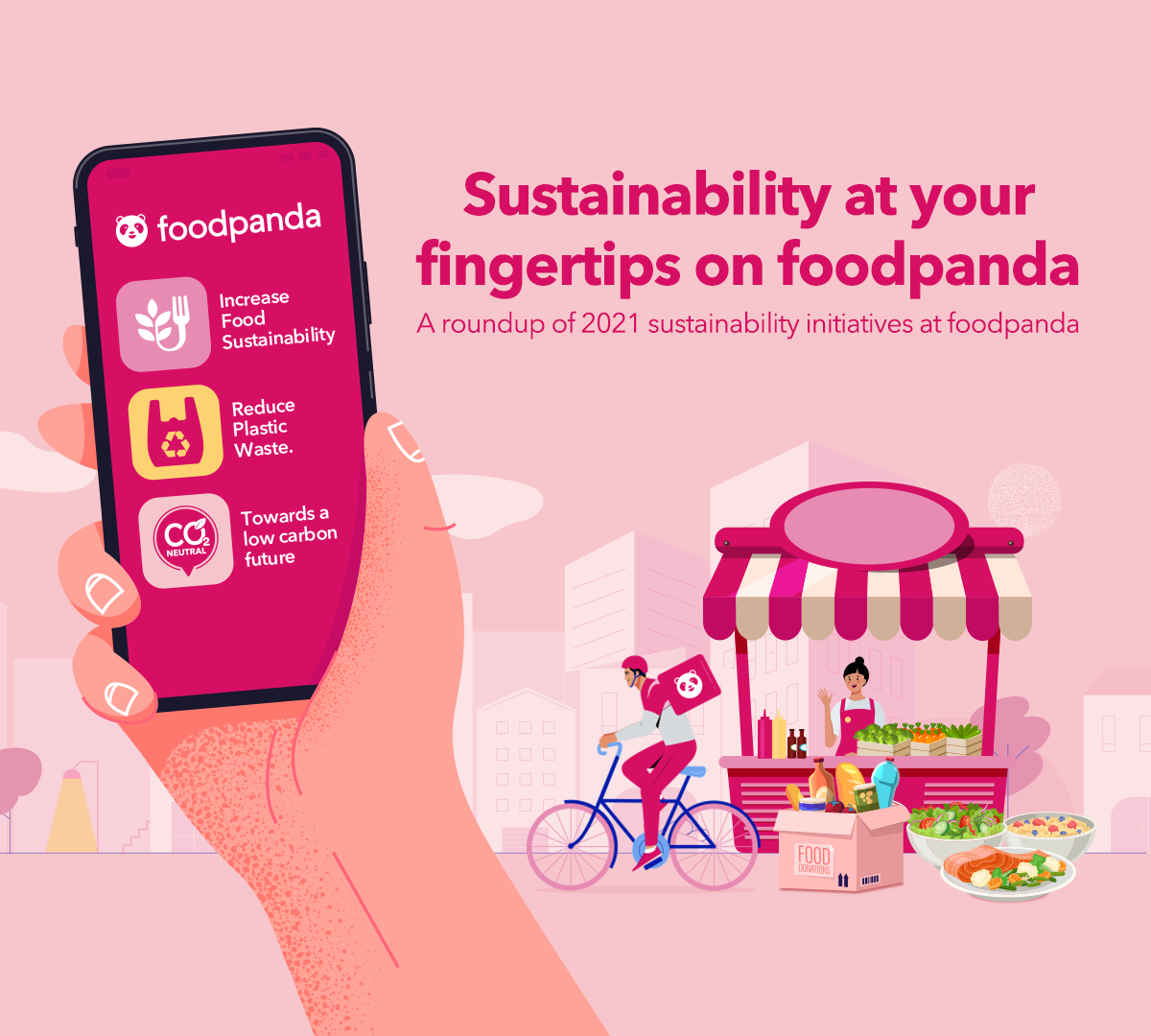- Throughout 2021, foodpanda ramped up efforts to tackle sustainability challenges in the food delivery industry, focusing on three key areas: increasing food sustainability, reducing plastic waste and lowering carbon footprint
- Key initiatives included the world’s first delivery of cultured meat on a food delivery platform, a global sustainable packaging pilot, and progressively greening its rider fleet across Asia
27 JANUARY 2022 — APAC (SINGAPORE) — As the largest food delivery platform in Asia outside of China, foodpanda has become a familiar sight in delivering essential items to millions of customers daily. With an expansive reach across 12 markets, foodpanda aims to help merchants, riders and customers adopt a more sustainable lifestyle by providing sustainable options on the platform.
In 2021, foodpanda rolled out five tech-enabled initiatives to meet its sustainability objectives: increase food sustainability, reduce plastic waste and aim towards a low carbon future. These initiatives, built on past efforts to reduce its environment footprint, include becoming the world’s first platform to deliver cultured meat, introducing sustainable packaging alternatives, and launching sustainable certification and reward programmes to encourage merchants to green their business operations.
“We want to use the power of collective action to tackle sustainability challenges in the food delivery industry. That means helping our community of merchants, riders and customers adopt more sustainable alternatives,” said Evelyn Tay, Vice President, Communications, Public Affairs and Sustainability, foodpanda. “When sustainable options and programs are available to alleviate cost pressures or simplify operational decisions, it’s easier for them to shift their habits – that’s when we can make a difference together.”
Delivering Convenience to Sustainable Living
According to a 2021 report by the Asia Food Challenge [1], Asian customers are becoming more aware about the environmental impact of food, with 80 percent of those surveyed saying they value an eco-friendly lifestyle. Among the food trends highlighted in the report are reducing food waste, choosing meat-free options, and limiting the use of plastic packaging.
foodpanda has been meeting a growing appetite for sustainable, plant-based food options by making them more readily available on the platform. At the same time, foodpanda works with merchant partners and riders to minimise the carbon footprint of each order by delivering food in eco-friendly containers and via sustainable transport. foodpanda also collaborates with local non-profit organisations such as the Bidyanodo Foundation to channel food surplus to local communities in-need.
Increasing convenience to sustainable food
- In April 2021, foodpanda became the world’s first food delivery platform to deliver cultured chicken meat in Singapore. Beyond Singapore, more than 6,000 restaurant partners across the region offer vegan and vegetarian options on the platform while foodpanda shops carry over 25,000 sustainable products including plant based meat, in partnership with local retailers, small and medium enterprises (SMEs) and specialty stores. pandamart, foodpanda’s cloud-grocery store network, also stocks meat alternative products from brands such as Beyond Meat, Impossible Foods and Quorn.
Reducing carbon footprint of each order on the platform
- As part of a global initiative by foodpanda’s parent-company Delivery Hero, foodpanda introduced the Sustainable Packaging Programme in Hong Kong and Singapore. Restaurant partners have access to compostable, 100 percent perfluoroalkoxy-alkanes (PFAS) free packaging sold at prices competitive to traditional packaging.
- Meanwhile, foodpanda Hong Kong and Taiwan have launched certification programmes – the Sustainable Restaurant Certification Scheme and the Green Vendor Programme respectively – to encourage restaurants to adopt sustainable practices in their operations. Restaurants are assessed based on their food source, types of packaging, and waste management. About 360 merchants have been certified as a sustainable vendor under these schemes as of January 2022.
- foodpanda has saved about 900 million pieces of single-use plastic cutlery in 2021 through its opt-out feature as default setting on the app.
- As of December 2021, about 20 percent of foodpanda’s total fleet delivers food using sustainable transportation means, such as on their bicycles, e-bicycles or on foot. For instance in Bangladesh, Hong Kong and Myanmar, more than 70 percent of riders deliver on foot, bicycles and e-bikes.
Tackling food waste while supporting local communities
In Bangladesh, foodpanda partnered with the Bidyanodo Foundation to distribute unsold or cancelled food orders on the platform to low-income communities. Volunteers from the non-profit organisation collect vegetables from pandamart and cancelled food orders from designated rider hubs before distributing them to communities living in slums and homeless individuals.
Looking Ahead: foodpanda’s 2022 sustainability goals
foodpanda aims to expand current technological features on the platform to provide customers with more ways to support sustainable businesses and adopt an eco-friendly lifestyle. This includes spotlighting restaurants with strong sustainability practices to help customers easily identify them, and giving customers the flexibility to opt for smaller food portions to avoid food wastage.
Separately, foodpanda intends to increase the percentage of riders delivering on sustainable modes of transportation to lower its carbon footprint. As the pandemic exacerbates global food insecurity, foodpanda will also double its efforts to establish local partnerships with food banks and community groups to channel food surplus to communities in-need.
[1] The Asia Food Challenge: Understanding the New Asian Consumer


Share